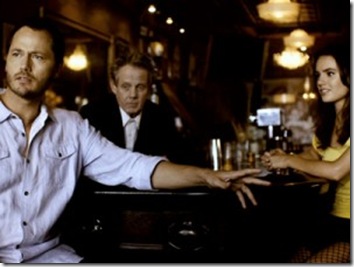Current TV calls its new drama, Bar Karma [Fridays, 10/9C], ‘the first community developed program’ – the unique concept comes from the show’s co-creator, Will Wright [creator of The Sims]. Set in the titular bar – that exists at ‘the edge of the universe’ – the series presents tales of people whose lives have taken unexpected turns and find themselves in the bar, at happy hour. Why? To change their fates and thereby save themselves and/or the world. The series premiere finds internet mogul Doug Jones leaving a tryst with a married woman. When he steps through her door he finds himself in bar – and then things get weird.
First, James [William Sanderson], the bartender is a bit off: he thinks suits would have made a comeback because of Reservoir Dogs – then asks Doug [Matthew Humphries] if it’s come out yet; then there’s the lone waitress, Dayna [Cassie Howarth], who refers to him as kid and recalls the song on the jukebox as coming out in her first year of high school [Doug notes that it just came out this year], and finally, there’s the fact that when he tries to leave, he winds up right back in the bar – and let’s leave the window in the bathroom for you to discover…
When the bar’s flatscreen [masquerading as a mirror] shows Doug on the news, being arrested for murder – and when he’s finally able to leave, he finds himself in the woman’s bedroom, discovering that she’s dead – he finally accepts that he’s not dreaming and the ep gets down to explanations. The universe is not a straightforward, A to B, kind of place. Instead, it is a series of separate timelines – and new ones are created every time there’s a branching event. James uses a physically impossible card trick to illustrate that effect. It seems that the bar exists in order to help people like Doug – people who have found themselves at some crisis point that has generated one of those branching events.
Bar Karma is a low-key dramedy that thinks big. It deals with the stuff of the universe and big concepts, like life, death, fate, free will and the concept of karma. There is no writer listed in the opening credits, but the closing credits list dozens of names under the heading of ‘developed by.’ Those people have contributed to storylines and once the ‘community at large’ settles on a final storyboard, the show’s producers adapt, ‘shoot, produce and edit the winning storyline into a 30-minute episode.’ Those whose contributions are used receive that ‘developed by’ credit. The idea is that anyone can go to the show’s website [http://current.com/shows/bar-karma/] and find out how to contribute.
The final product is a remarkably engaging and entertaining show that doesn’t feel like the result of a committee. Somehow, the efforts of all those who contributed have been turned into one feels like a unique vision.
In a way, Bar Karma feels like one of those gently reproving episodes of Twilight Zone where things work out in mysterious ways and to mysterious ends. The premiere would not have been out of place in Rod Serling’s classic series – and considering the heavy lifting that is required to set up the series concept in a mere half-hour, that’s pretty impressive. It doesn’t hurt to have someone of Sanderson’s talent anchoring the proceedings, either.
The premiere is not flawless – occasionally, the dialogue is a bit stilted and the appearance of William Wallace mid-way through is clunky, if fun – but with the heavy lifting done, I’m curious to see how well the series develops from here.
Final Grade: B+
